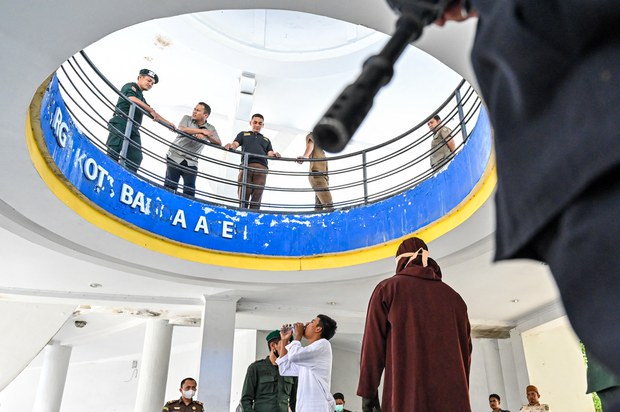Indonesia disputes US call for crackdown over religious freedom violations
2024.05.02
Jakarta
 A man drinks water after being caned in Banda Aceh, Indonesia, by a member of the Sharia police as punishment for consuming alcohol, Aug. 2, 2023.
A man drinks water after being caned in Banda Aceh, Indonesia, by a member of the Sharia police as punishment for consuming alcohol, Aug. 2, 2023.
An Indonesian official on Thursday dismissed as “excessive” an American government commission’s recommendation that the Biden administration put the Southeast Asian nation on a special watchlist for allegedly engaging in or overlooking severe violations of religious freedom.
Rumadi Ahmad, a staff expert at the office of the presidential staff, said Indonesia had made regulatory improvements and resolved religious conflicts.
He spoke to BenarNews in response to the Wednesday release of an annual report by the United States Commission on International Religious Freedom (USCIRF), which alleged that Jakarta criminalized blasphemy and hate speech without clear definitions.
“I believe this recommendation is excessive,” he said. “The Indonesian government is consistently making improvements, both in terms of regulations and in the prevention and resolution of various religious conflicts.”
He cited ongoing revisions to a joint ministerial regulation on building houses of worship and changes in the new criminal code that exclude certain statements from falling under blasphemy laws. Those include objective, non-threatening statements within one’s own circle or for scientific purposes.
Diverse landscape
While Indonesia, the world’s most populous Muslim-majority nation, boasts a diverse religious landscape, concerns have long been raised about the treatment of minority faiths. Existing blasphemy laws have been used to prosecute individuals based on their beliefs, according to activists.
Additionally, the Information and Electronic Transactions Law has been criticized for its broad application, allowing authorities to target religious expression online.
“Indonesia’s blasphemy laws ... have long been a tool for prosecuting individuals for their religious beliefs,” the USCIRF report said.
The report identified Indonesia’s new criminal code, expected to take effect in 2026, as a further threat to religious liberties.
It also criticized a 2006 joint decree on houses of worship for enabling “ongoing and systematic violations” against religious minorities.
In June 2023, Religious Affairs Minister Yaqut Cholil Qoumas announced plans to eliminate the need for a recommendation from Forum Kerukunan Umat Beragama (FKUB) representing recognized religions in Indonesia, as a condition for establishing houses of worship.
Human rights groups have criticized this required recommendation for the construction of houses of worship because, they say, it creates unnecessary bureaucracy and hinders the rights of minority religious communities. In addition, the FKUB’s close ties to the government have raised questions about its independence and ability to advocate for the rights of all religious groups.
Persecution in 2023
Instances of religious persecution continued throughout 2023, USCIRF said in its report. In February, authorities disrupted a Pentecostal church service, citing a lack of permits. In August, a mob damaged a church in Riau Islands province.
The Indonesian government’s promotion of the Pancasila ideology, which emphasizes monotheism, excludes indigenous religious groups and creates discrimination, the report noted.
“Its promotion of this ideology extends only to officially recognized religions and does not include indigenous religious communities or nontheists. As a result, members of unrecognized religions face legal hurdles in acquiring government jobs and having their marriages officially recognized,” the report said.
Despite some positive developments, such as the recognition of a seventh religious category on official IDs, USCIRF highlighted the persistence of mandates that force even non-Muslims to adhere to Islamic codes.
“Government officials and politicians throughout Indonesia increasingly engaged in rhetoric and passed local laws and regulations citing Islamic values that target or ostracize religious, gender and sexual minorities. In January, the mayor of Medan, North Sumatra, declared the city ‘LGBT-free’ [lesbian, gay, bisexual, transgender] in an effort to appeal to certain religious actors,” the report said.
“In West Java, politicians inspired by the MUI and other similar religious organizations promulgated municipal- and regency-level laws that used language around ‘morality’ and religion to exclude minorities from the public space,” the report said, using an acronym for Indonesian Ulema Council (MUI), a semi-official body of clerics.
Indonesia’s 2023 chairmanship of the Association of Southeast Asian Nations (ASEAN) did little to significantly improve the religious freedom landscape, according to the report.
It urged the government to repeal the blasphemy laws, reform the regulation on constructing houses of worship and the information technology law to ensure greater religious freedom online and take effective action against those who commit violence against religious minorities.







